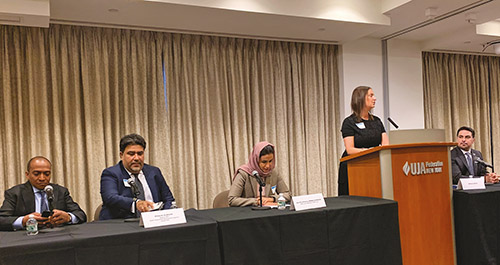



On November 18, UJA-Federation of NY hosted a program entitled, “Strengthening the Abraham Accords Through Business,” for Jewish leaders to meet and engage with leading Dubai government representatives and Dubai-based business leaders. The delegation shared insights into the growing economic opportunities provided through this historic agreement between Israel and the United Arab Emirates.
Natalie Barth, UJA’s moderator, began, “As you know, it has been a little over a year since the Abraham Accords signified a new era of collaboration in the Middle East. The blossoming relationship between Israel and the United Arab Emirates is a cause for hope and optimism. UJA is thrilled to host this delegation.”
UAE Consul-General Amna Almheiri began her remarks in admiration of her country’s 50th anniversary golden jubilee which will take place in two weeks. Since 1971, it has amassed a population of 10 million. “When I introduce myself as from the UAE, the first thing most think of is oil.” She recalled that one grandfather was a fisherman and the other a pearl diver, at a time when their economy really depended on pearl diving. The 1940’s discovery of artificial pearls took a toll on the UAE’s economy. “Since then, the UAE learned its lesson. We are a diverse economy with diversification away from oil. The UAE is the second largest economy in the Arab world, which is no small feat.
The US was one of the first countries to establish formal diplomatic relations with the UAE, and built strong ties. The US has an enormous stake in each nation’s economy for open trade. The UAE is one of the largest international investors in the US, as well as the biggest Middle East and North Africa export market for US goods.
Almheiri added, “UAE’s reinvestment is a significant contributor to the US economy and job creation, with trade and investment across all 50 states supporting approximately 88,000 American jobs.”
Almheiri noted, “New initiatives will accelerate growth and improve the US position as a Middle East preferred business hub, seeking to accelerate economic and social reforms and prepare for the post-pandemic future by rebuilding the country’s residency system to attract world class talent. Political stability, open economy, attractive business environment and continued economic growth make it a prime location for trade and investment. The UAE is focused on sectors of wholesale and retail trade, real estate, financial services and manufacturing.” Foreign investors are allowed 100% business ownership anywhere in the Emirates, as well as remote working visas and multiple-entry tourist visas. The UAE is developing business sectors that are competitive at a global level and make the country even more attractive for investment.
Almheiri noted that following the Abraham Accords, 60 major deals have been signed between the UAE and Israel, in technology, tourism, health, the environment, renewable and clean energy, and agricultural innovation for growing in desert conditions. Almheiri added, “This is something that was unimaginable. The benefits are compelling. I believe more must be done to extend and deepen opportunities.”
The next speaker was Fahad Algergawi, CEO, Dubai Investment Development Agency (Dubai FDI), providing support of foreign businesses looking to invest in Dubai’s thriving economy and to take advantage of its global strategic importance. Algergawi explained that he was privileged to meet with the first Israeli delegation that came to Abu Dhabi. He recalled that for four months after these meetings, there was not a week that went by without having at least five interactions with Israeli companies. “What we saw was a great potential for growth.” Algergawi recounted that just two months after the accords, a professional Israeli soccer player joined a UAE club. “He makes the crowd cheer and jump. That normalization and reality brings us today to be among friends.”
Khalid Alboom, deputy CEO with Algergawi, is not a fan of his boss’ favorite soccer club, but is pleased to see an Israeli player nonetheless. He noted their great city offers a large population for business opportunities. Ahmed Hamza, of the government’s Dubai Multi-Commodities Center, commented, “DMCC is the largest free trade zone in the UAE, with 20,000 member companies from over 170 different nationalities and many different sectors.”
Essa Sulaiman Ahmad, Emirates Airlines’ divisional VP, joined in with a big announcement. “On December 5, on the eighth day of Hanukkah, we are going to start our flights from Dubai to Tel Aviv. Out of New York, we’ll be flying four flights a day to connect seamlessly to Tel Aviv in a three-class configuration. Connecting out of Tel Aviv, we have 120 destinations, and with our partners, 200 countries. This is only the start; there is more to come.” Additionally, his airlines’ kosher meals are “best in the business.”
Almheiri concluded, “I’m very happy the coming generation will live in a region that allows dialogue, acceptance, living side-by-side, respecting everyone. That’s exactly the UAE vision.”
By Judy Berger











